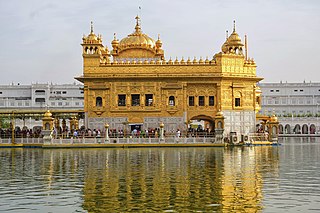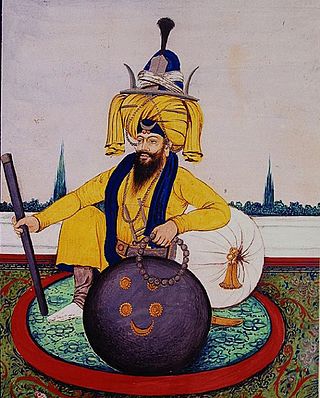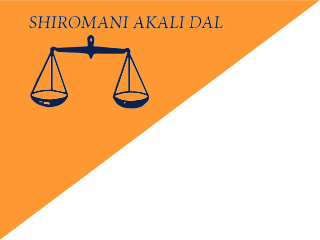
The Khalistan movement is a separatist movement seeking to create a homeland for Sikhs by establishing an ethno‐religious sovereign state called Khalistan in the Punjab region. The proposed boundaries of Khalistan vary between different groups; some suggest the entirety of the Sikh-majority Indian state of Punjab, while larger claims include Pakistani Punjab and other parts of North India such as Chandigarh, Haryana, and Himachal Pradesh. Shimla and Lahore have been proposed as the capital of Khalistan.
The following outline is provides an overview of Sikhism, or Sikhi.

Panth Rattan Shiri Gurcharan Singh Tohra was a president of Shiromani Gurdwara Parbandhak Committee (SGPC), a Sikh body in charge of controlling Gurdwara. He died of a heart attack in New Delhi on 1 April 2004 at the age of 79. He remained the head of the SGPC for a record 27 years, and was one of the most influential and controversial Sikh leaders of the 20th century.

The Shiromani Gurdwara Parbandhak Committee is an organization in India responsible for the management of Gurdwaras, Sikh places of worship in states of Punjab and Himachal Pradesh and the union territory of Chandigarh. SGPC also administers Darbar Sahib in Amritsar.

Dal Khalsa is an extremist Sikh organisation, based in the city of Amritsar. The outfit was formed in 1978 by Gajinder Singh, the hijacker of Indian Airlines Flight 423. It came to prominence during Insurgency in Punjab, India along with Jarnail Singh Bhindranwale in 1981. Members of the Dal Khalsa have also been accused of the assassination of Lala Jagat Narain. The primary aim of Dal Khalsa is to form a religion-based Sikh nation called Khalistan.

Baldev Singh was an Indian Sikh political leader, he was an Indian independence movement leader and the first Defence Minister of India. Moreover, he represented the Punjabi Sikh community in the processes of negotiations that resulted in the independence of India, as well as the Partition of India in 1947.

Tara Singh was a Sikh political and religious figure in India in the first half of the 20th century. He was instrumental in organising the Shiromani Gurdwara Prabhandak Committee and guiding the Sikhs during the partition of India, which he sometimes strongly opposed, however much of his life he advocated simply for a “Azad Punjab”(Free Punjab) before demanding the independent nation of “Sikhistan” just prior to partition.

Sikhism in Pakistan has an extensive heritage and history, although Sikhs form a small community in Pakistan today. Most Sikhs live in the province of Punjab, a part of the larger Punjab region where the religion originated in the Middle Ages, with some also residing in Peshawar in the Khyber-Pakhtunkhwa province. Nankana Sahib, the birthplace of Guru Nanak, the founder of Sikhism, is located in Pakistan's Punjab province. Moreover, the place where Guru Nanak Dev died, the Gurudwara Kartarpur Sahib is also located in the same province.
Guru Nanak founded the Sikh faith in the Punjab region of the northern part of the Indian subcontinent in the end of fifteenth century. He was first of the ten Sikh Gurus. The tenth, Guru Gobind Singh, formalised its practices on 13 April 1699. He baptised five Sikh people from different parts of India, with different social backgrounds, to form the Khalsa. Those five Beloved Ones, the Pañj Piārē, then baptised him into the Khalsa fold. This gives the order of Khalsa a history of around 500 years. Historical theory and analysis suggests that Sikhism came into existence during the early Medieval period of the Bhakti movement and also after repeated invasions by Muslim rulers upon the Hindu community during Mughal rule, which lasted between especially in the region of North India.
Sunder Singh Lyallpuri was a leading Sikh member of the Indian independence movement, a general of the Akali Movement, an educationist, and journalist. Lyallpuri played a key role in the development of the Shiromani Akali Dal, and in the Gurdwara Reform Movement of the early 1920s and also founding member of Central Sikh League. He took part in several roles in the establishment and growth of Indians independence.

Sardar Hukam Singh was an Indian politician and the third Speaker of the Lok Sabha and second Deputy Speaker of the Lok Sabha from 1962 to 1967. He was also governor of Rajasthan from 1967 to 1972.

Teja Singh Akarpuri was an Indian and Sikh politician who served as the 11th Jathedar of Akal Takht from 1921 to 1923 and 1926 to 1930. He was the First MP from Gurdaspur constituency In Lok Sabha from 1952 to 1957 and was succeeded by Diwan Chand Sharma.

Indian Sikhs number approximately 21 million people and account for 1.7% of India's population as of 2011, forming the country's fourth-largest religious group. The majority of the nation's Sikhs live in the northern state of Punjab, which is the only Sikh-majority administrative division in the world.

The Delhi Sikh Gurdwara Management Committee (DSGMC) is organization in India responsible for the management of Gurdwaras, Sikh places of worship in Delhi. It also manages various educational institutions, hospitals, old age homes, libraries and other charitable institutions in Delhi. It is headquartered in Gurdwara Rakab Ganj Sahib, near Parliament House. Currently, the president of DSGMC is Harmeet Singh Kalka.
Sardar Bahadur Governor BhaiUjjal Singh was an Indian politician who served as the Governor of Punjab, followed by acting Governor of Tamil Nadu. Prior to this he was a participant in the First Round Table Conference, opened officially by King George V on 12 November 1930.

The Singh Sabha Movement, also known as the Singh Sabha Lehar, was a Sikh movement that began in Punjab in the 1870s in reaction to the proselytising activities of Christians, Hindu reform movements and Muslims. The movement was founded in an era when the Sikh Empire had been dissolved and annexed by the British, the Khalsa had lost its prestige, and mainstream Sikhs were rapidly converting to other religions. The movement's aims were to "propagate the true Sikh religion and restore Sikhism to its pristine glory; to write and distribute historical and religious books of Sikhs; and to propagate Gurmukhi Punjabi through magazines and media." The movement sought to reform Sikhism and bring back into the Sikh fold the apostates who had converted to other religions; as well as to interest the influential British officials in furthering the Sikh community. At the time of its founding, the Singh Sabha policy was to avoid criticism of other religions and political matters.

Akali Phula Singh Nihang was an Akali Nihang Sikh leader. He was a saint soldier of the Khalsa Shaheedan Misl and head of the Budha Dal in the early 19th century. He was also a senior general in the Sikh Khalsa Army and commander of the irregular Nihang of the army. He played a role in uniting Sikh misls in Amritsar. He was not afraid of the British who at many times ordered for his arrest but were not successful. During his later years he served for the Sikh Empire as a direct adviser to Maharaja Ranjit Singh. He remained an army general in many famous Sikh battles up until his martyrdom in the battle of Nowshera. He was admired by the local people and had a great influence over the land and his settlement was always open to help the poor and helpless. He was well known and was a humble unique leader and prestigious warrior with high character. He was also known for his effort to maintain the values of Gurmat and the Khalsa panth.

Sardar Kapur Singh (1909–1986) was an Indian civil servant in Punjab and later a politician belonging to Shiromani Akali Dal. He was a Sikh intellectual, and wrote about Sikh religion and politics. He was also the author of the Anandpur Sahib Resolution of the Akali Dal in 1973, demanding rights of Punjab and the Sikh community. Singh was proficient in multiple languages including English, Punjabi, Persian, Arabic and Sanskrit.

Baba Darbara Singh, also known as Diwan Darbara Singh, was second Jathedar of Budha Dal and third leader of the Akal Takht. He should not be confused with other Darbara Singh of Sirhind who fought in the Battle of Anandpur.

The Shiromani Akali Dal (SAD) is a centre-right Sikh-centric state political party in Punjab, India. The party is the second-oldest in India, after Congress, being founded in 1920. Although there are many parties with the description Akali Dal, the party that is recognized as "Shiromani Akali Dal" by the Election Commission of India is the one led by Sukhbir Singh Badal. The party has a moderate Punjabi agenda. On 26 September 2020, they left the NDA over the farm bills.
















